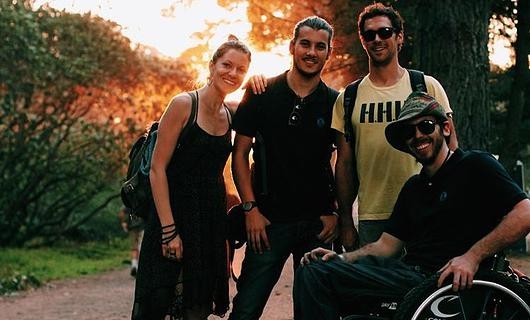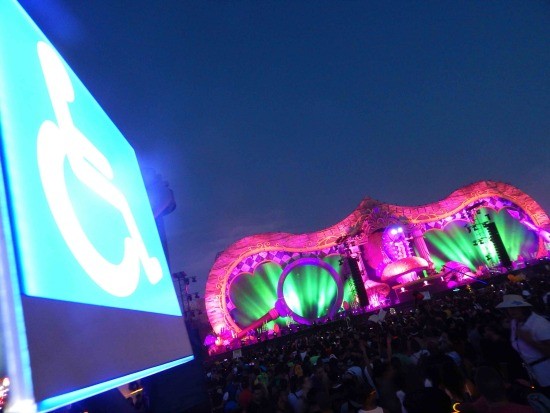
Coachella 2008 was a life changing weekend for Austin Whitney and not for the superfluous reasons you'd expect. He'd spent the day traversing the widespread fairgrounds–it was 110 degrees, he was in a wheelchair, and the accommodations were far from accessible. But how he got there and why this moment was somewhat earth-shattering all started the summer of 2007.
Whitney had just graduated from high school, was set to attend University of Michigan, and he'd even received his football passes for the upcoming season. That all changed the night he was driving, with two of his friends, when he hit a curb going 50 mph. When he woke up in the hospital he was unable to feel his toes. He'd broken his pelvis, spine, and both of his ribs which cut open his lungs and liver causing internal bleeding. His friend Robert had a broken wrist, his friend Rory was ejected from the car (which saved his life) and he suffered a number of injuries.
]
Whitney spent the next several months trying to justify his existence but he kept moving forward. “I thought 'make tomorrow better than today, just work in that direction. Even if you don't buy it 100% try it,” he says. “The best advice I got when I was in the hospital was that you can't control the physical reality of your injuries but you can control your attitude. Feeling bad for yourself is a choice but having a good attitude makes things better in the long run.”
He attended classes locally at Saddleback College until transferring to UCSB where he'd spend the next three quarters. In search of things to occupy his mind, he began to scuba drive and skydive but nothing quite satiated this void he felt like music did. He decided he wanted to attend Coachella but he didn't think it was possible. Great friends assured they'd make it happen and so there he was, listening to Roger Waters perform “In the Flesh” with a smile on his face thinking, “Life doesn't have to be shitty. There are still moments to enjoy,” he says.
Music had always played an important role in Whitney's life. His parents are lovers of classic rock, so Floyd and the Grateful Dead are apart of his DNA. After Coachella, music had once again injected meaning and purpose into his life. Whitney transferred to UC Berkeley where he began volunteering at festivals and later he received his undergraduate degree. In 2011 he began law school at Berkeley and went on to work in ADA (American's with Disabilities Act) compliance for companies like Insomniac, producer of EDC and Nocturnal.
He spent a summer working for the Oregon Supreme Court but soon realized he'd rather use his knowledge of law not in the courtroom but at festivals, educating producers and working alongside disabled patrons. That's when he founded Accessible Festivals, a non-profit organization in 2014. Whitney, along with his business partner and longtime friend Oren, are currently working with 19 promoters throughout the U.S. and have 30 festivals lined up for the season. Whitney attributes their success to one simple question he asks to festival attendees “what can I do make this festival more enjoyable for you–even if you're painting me a perfect world.” With their response the organization tries to find a way to make it happen or offer a comparable solution.
[

Each time they return to a festival Whitney explains there is a doubling of disabled attendees. Why? Because through Whitney's personal triumphs and his knowledge of law he can better equip festivals to accommodate people with everything from a gluten intolerance, to a sprained ankle, to those that are deaf or paraplegics. He educates his volunteers about Title 3 of the ADA, public accommodation law, festival production, and disability awareness.
“We're also big advocates of hearing loss prevention” Whitney says. “If you're not disabled going into it you shouldn't leave with a disability. It's tangental but it's important. We give out ear plugs and we encourage people to wear them!”
One of the most important parts of Whitney's job and his cause is problem solving. He can design a 32 x16 foot platform with an impeccable view of the festival but if no one can find it, or if it's going to take people an hour to find a bathroom and return, then it's not beneficial. His response to this issue is LED lighting, he tested this out at Nocturnal in San Bernardino a few weeks back and the results were mind blowing. The first night they experienced technical difficulty and his max on the platform was 18. The following night, when the sign was working, there were nearly 60 people because no matter where you were standing you could find the overhead ADA sign.
Yet another example of his problem solving genius is Accessible Festival's partnership with SUBPAC. This system is designed to turn an audio source into sensations so that people feel different frequencies. It's a way of augmenting the sound for deaf and hard of hearing patients and the organization owns about a dozen backpacks that they're able to loan attendees during the festival.
The most humbling part of all of this for Whiney is when he's approached by others that have found meaning in their life again through these festivals, just like he did back in 2008.
One of the screws, that came out of his spine, hangs from a chain around his neck as a reminder of his past. After all its led him down a path he could have never imagined but Whitney is proud of the man it's made him today.
This is only the beginning for Accessible Festival's and we look forward to watching their growth in the festival community.
See also:
Coachella 2015 Set Times Announced
The 50 Most Beautiful People at Coachella
Funniest Coachella Craig's List Ads for Hook-ups and Casual Encounters
Follow Heard Mentality on Twitter and Facebook!

